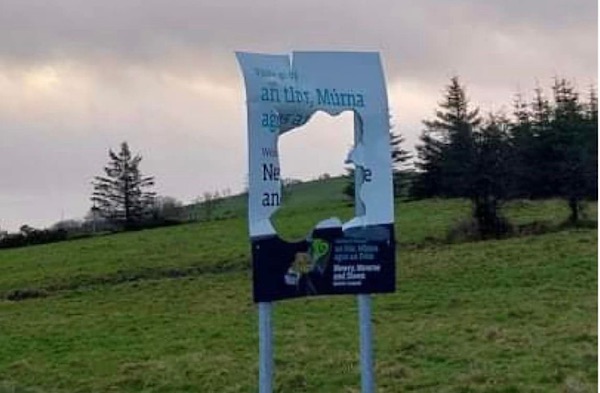
There were celebrations for Irish speakers on New Year’s Day as the Irish language became an official language of the European Union, but it has piled on pressure for the implementation of rights for speakers in the north of Ireland.
The long-awaited change in Brussels places the Irish language on a par with the 23 other official languages of the EU, including English, French, German, Spanish and Italian.
It brings to an end the treatment of Irish as a minority or peripheral language in Europe. Now, all documents published by the EU will be translated into Gaeilge.
It marks a major step forward for a language which was once completely banned under English rule. The Penal Laws of the 18th and 19th centuries made it illegal for Irish Catholics to read or speak their native tongue. It was the worst chapter in a history of persecution which continues to this day in the north of Ireland.
The enhanced EU status of the Irish language is “a significant achievement”, said Irish President Michael D Higgins. He said it is now time for the public to ‘throw off all the inhibitions’ surrounding Ireland’s own language.
“While the language will now be in every day use in the EU, we must now seize the opportunity to also take responsibility for ensuring that it means something in our own lives,” he said.
“I gcroílár gnóthaí laethúla na hEorpa; i gcroílár an tsaoil sa bhaile (At the heart of daily business in Europe; at the heart of life at home).”
He added: “We have, in this coming year not only a responsibility, but a joyful opportunity to ensure that our native language is available and valued by our future generations. The Irish language is that of us.”
END THE TRICKS
But the full recognition of Irish in Europe has shone a harsh new light on its treatment at home in the Six Counties, where Irish speakers continue to have their rights denied.
As in Newtownhamilton, County Armagh this week (pictured), bilingual signs erected by nationalist councils are routinely defaced in an effort to continue the second-class status of Irish under British rule.
Since 1998, official promises and signed agreements to bring forward legislation have been broken on at least four occasions, most recently last year.
So new reports that legislation will finally be presented at Westminster before the end of this month are being viewed with scepticism. Ahead of the Stormont Assembly elections in May, Irish language activists have said the deceptions and discrimination must end.
Conchúr Ó Muadaigh, advocacy manager with Conradh na Gaeilge, said his group wants “action” rather than another formal commitment.
“The British government must immediately fulfil their June 2021 promise to bring this legislation through Westminster before the executive mandate ends in March, honouring its commitment and ensuring enough time for the appointment of an Irish language commissioner,” he said.
“There is little point in this legislation if the appointment of a commissioner and the core functions of that office is to be left in limbo for another undefined time, robbing it of any practical effect.”
Noting the developments in Europe, Dr Padraig Ó Tiarnaigh of CnaG noted that Irish now has “more legal protections in Brussels than it does in Belfast”.
“As we approach two years since the Executive was reformed on the basis of the January 2020 New Decade New Approach agreement, Irish speakers here in the north remain excluded and marginalised, with incredibly limited opportunities to use the language with the state or see the language in public,” he said.
“We have but a few short months before the upcoming Assembly elections... If this legislation remains outstanding by then, it will inevitably re-emerge as a central election issue in the months ahead.”
![[Irish Republican News]](https://republican-news.org/graphics/title_gifs/rn.gif)
![[Irish Republican News]](https://republican-news.org/graphics/title_gifs/harp.gif)

